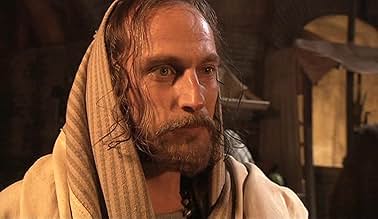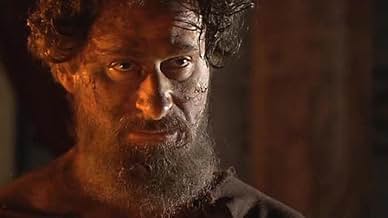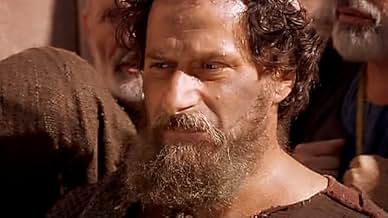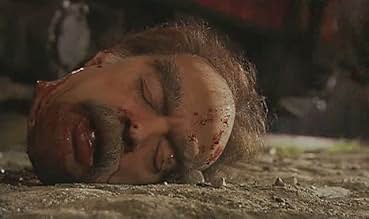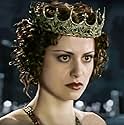AVALIAÇÃO DA IMDb
7,5/10
5,1 mil
SUA AVALIAÇÃO
O diabo e seus assistentes visitam Moscou na época do regime de Stalin. A ideologia ateísta oficial se confronta com uma série de eventos sobrenaturais.O diabo e seus assistentes visitam Moscou na época do regime de Stalin. A ideologia ateísta oficial se confronta com uma série de eventos sobrenaturais.O diabo e seus assistentes visitam Moscou na época do regime de Stalin. A ideologia ateísta oficial se confronta com uma série de eventos sobrenaturais.
- Prêmios
- 3 indicações no total
Explorar episódios
Avaliações em destaque
"Master and Margarita", the book and the movie:
I have read "Master and Margarita" three times, and I am sure that I will read it again. I was very lucky because all three times I read it in Russian, and even the best translation can not compare to the original. Every time, I found something new in the book; it would turn to me by different facets. "Master and Margarita" is incredibly beautiful, deep, sophisticated yet playful and sparkling book with unforgettable characters. In fact, it is not one novel but three. First, about the adventures of the Devil and his company in 1920's Moscow; second, about Pontius Pilatus and Jesus in Jerusalem of the first century, and the third one, about the Master, the writer who wrote the second novel, and his eternal and true love, Margarita. The story of Master and Margarita is the story of Bulgakov and his wife and muse, Elena. All three stories are interconnected and intertwined. All three end with the exactly same phrase, "...the cruel fifth procurator of Judea, the equestrian Pontius Pilatus."
So, what is the book about? Good, evil, betrayal, talent, love, forgiveness? Yes, it is. But it is so much more.
I had a lot of doubts before watching the film because as much as I wanted to see "Master and Margarita" on screen I was not sure that it was possible to adapt it and not to lose anything significant - which is everything.
I am pleasantly surprised - the film is very good. It is respectful, thoughtful and as close to the spirit of the greatest Russian novel of the last century as possible.
The movie is not perfect (and I don't think that the perfect transfer is possible) but the choice of actors, the music score, the visual palette that change as we enter the different eras, places, and dimensions are outstanding. I was initially surprised by some names but almost every actor proved him/herself very capable in bringing to the screen well known and beloved characters. I would say that some of special effects could be ...well, more special - for example, the mischievous talking cat Behemoth could be done more interestingly. I also don't see the exact reason for creating a new character, the man in uniform with the glasses and very recognizable accent who is in charge of investigating the "crimes of the band of powerful hypnotists" - how they call Woland and his entourage. One can argue that the titular couple, the tragic lovers, Master and Margarita are weaker and their story seems pale in the comparison to one of Pilatus
(bravo to 80 year old stage and screen legend, Kirill Lavrov who can be remembered as Ivan Karamazov in The Brothers Karamazov (1969) and Ieshua Ha-Notsri (incredible performance by the young bright star, Sergei Bezrukov of "Brigada"'s fame, almost unrecognizable as Ieshua). I think no one can deny that Oleg Basilashvili as powerful, cynical and eternally wise Woland, the part of Power " Which wills forever evil Yet does forever good" IS the true Master of the series. My fascination and admiration belong to Alexander Abdulov on whom I as a young girl had a huge crush in his early film "Obyknovennoye Chudo" . For many years he had been the Russian sex symbol but his enormous comical talent found its match in the part of Woland's assistant/ translator, Koroviev. His and Behemoth's adventures in Moscow are screamingly funny. I think that the film is a successful and enjoyable adaptation of the beloved cult novel and I recommend seeing it. I am going to order the sound track. As I mentioned, the music by Igor Kornelyuk is one of the film's treasures.
P.S. I used to work on the street where the last home of Mikhail Bulgakov was. He was taken to the cemetery from there.
The famous "Pashkov's House" with the rotunda on the top where Woland and his team gathered together before they left Moscow forever, was in walking distance from my work, and I remember, once, I almost got hit by a car -I walked and looked at that music in stone and could not take my eyes off it.
I have read "Master and Margarita" three times, and I am sure that I will read it again. I was very lucky because all three times I read it in Russian, and even the best translation can not compare to the original. Every time, I found something new in the book; it would turn to me by different facets. "Master and Margarita" is incredibly beautiful, deep, sophisticated yet playful and sparkling book with unforgettable characters. In fact, it is not one novel but three. First, about the adventures of the Devil and his company in 1920's Moscow; second, about Pontius Pilatus and Jesus in Jerusalem of the first century, and the third one, about the Master, the writer who wrote the second novel, and his eternal and true love, Margarita. The story of Master and Margarita is the story of Bulgakov and his wife and muse, Elena. All three stories are interconnected and intertwined. All three end with the exactly same phrase, "...the cruel fifth procurator of Judea, the equestrian Pontius Pilatus."
So, what is the book about? Good, evil, betrayal, talent, love, forgiveness? Yes, it is. But it is so much more.
I had a lot of doubts before watching the film because as much as I wanted to see "Master and Margarita" on screen I was not sure that it was possible to adapt it and not to lose anything significant - which is everything.
I am pleasantly surprised - the film is very good. It is respectful, thoughtful and as close to the spirit of the greatest Russian novel of the last century as possible.
The movie is not perfect (and I don't think that the perfect transfer is possible) but the choice of actors, the music score, the visual palette that change as we enter the different eras, places, and dimensions are outstanding. I was initially surprised by some names but almost every actor proved him/herself very capable in bringing to the screen well known and beloved characters. I would say that some of special effects could be ...well, more special - for example, the mischievous talking cat Behemoth could be done more interestingly. I also don't see the exact reason for creating a new character, the man in uniform with the glasses and very recognizable accent who is in charge of investigating the "crimes of the band of powerful hypnotists" - how they call Woland and his entourage. One can argue that the titular couple, the tragic lovers, Master and Margarita are weaker and their story seems pale in the comparison to one of Pilatus
(bravo to 80 year old stage and screen legend, Kirill Lavrov who can be remembered as Ivan Karamazov in The Brothers Karamazov (1969) and Ieshua Ha-Notsri (incredible performance by the young bright star, Sergei Bezrukov of "Brigada"'s fame, almost unrecognizable as Ieshua). I think no one can deny that Oleg Basilashvili as powerful, cynical and eternally wise Woland, the part of Power " Which wills forever evil Yet does forever good" IS the true Master of the series. My fascination and admiration belong to Alexander Abdulov on whom I as a young girl had a huge crush in his early film "Obyknovennoye Chudo" . For many years he had been the Russian sex symbol but his enormous comical talent found its match in the part of Woland's assistant/ translator, Koroviev. His and Behemoth's adventures in Moscow are screamingly funny. I think that the film is a successful and enjoyable adaptation of the beloved cult novel and I recommend seeing it. I am going to order the sound track. As I mentioned, the music by Igor Kornelyuk is one of the film's treasures.
P.S. I used to work on the street where the last home of Mikhail Bulgakov was. He was taken to the cemetery from there.
The famous "Pashkov's House" with the rotunda on the top where Woland and his team gathered together before they left Moscow forever, was in walking distance from my work, and I remember, once, I almost got hit by a car -I walked and looked at that music in stone and could not take my eyes off it.
I have read M&M probably 10 times, the Michael Glenny English translation (the others are worthless). This series is a great effort to visualise Bulgakov's grand novel. It is immediately apparent that a series of short films is the best format, so good on the funders and producers for getting that right. Most scenes are just how I pictured them, which really says something for Bulgakov's powers of communication.
I really liked the cast. Initially I was very surprised at the 'old' Pilate (Kirill Lavrov - at 80!), but after 5 minutes of being mesmerised, I realised he must be one of Russia's greats (and indeed he is). Although his age is technically unrealistic for a Roman procurator of Judea, it is a masterclass in acting. Woland (Oleg Basilashvili) is a towering presence, just the right combination of menace and pathos. Kovalchuk certainly looks the part as Margarita - and I am not sure that she could have played her much differently: it is a difficult character to understand from the book, one whose actions but not thoughts are externalised.
Great music. Decent enough special effects & animatronics to cover the magic bits (some younger people will complain about them, but you are forgetting that good actors in a real theatre can make you believe anything, and there the sets are just painted wood). Overall the pace feels right. I think its an excellent overall effort.
Any true M&M fans will appreciate this work, and I am sure find it easy to ignore the small flaws.
I really liked the cast. Initially I was very surprised at the 'old' Pilate (Kirill Lavrov - at 80!), but after 5 minutes of being mesmerised, I realised he must be one of Russia's greats (and indeed he is). Although his age is technically unrealistic for a Roman procurator of Judea, it is a masterclass in acting. Woland (Oleg Basilashvili) is a towering presence, just the right combination of menace and pathos. Kovalchuk certainly looks the part as Margarita - and I am not sure that she could have played her much differently: it is a difficult character to understand from the book, one whose actions but not thoughts are externalised.
Great music. Decent enough special effects & animatronics to cover the magic bits (some younger people will complain about them, but you are forgetting that good actors in a real theatre can make you believe anything, and there the sets are just painted wood). Overall the pace feels right. I think its an excellent overall effort.
Any true M&M fans will appreciate this work, and I am sure find it easy to ignore the small flaws.
This TV-series of 10 episodes, broadcast at the end of 2005 on the Russian Telekanal Rossiia, scored unprecedented ratings.
It was the second attempt of director Vladimir Bortko to film Bulgakov's masterpiece. In 2000 he had already been solicited by the Kino-Most film studio, associated with the competing channel NTV, but at the last moment the company did not succeed to come to an agreement with Sergei Shilovsky, grandson of Bulgakov's third wife, and owner of the copyrights. This time, with Rossiia, it worked. And it did not pass unnoticed.
This TV-epopee of more than 8 hours was heavily criticized, or at least regarded with much skepticism, before it was shown on screen. Sometimes it was sincere and well-grounded concern about the authenticity, but sometimes it seemed as if the Bulgakov die-hards behaved like modern Latunsky's by reproaching a movie they hadn't seen yet with sacrilege. Or maybe it was because of the gigantic publicity campaign that was launched to promote the series, and that could give reasons to fear an ambitious, but superficial Hollywood-ish production. But fortunately it wasn't the case.
In contrast with the earlier screen adaptation of Aleksandar Petrovic in 1972, director Vladimire Bortko (° Moscow, 1946) followed the book meticulously. If you have 10 times 52 minutes available for it, it is of course, easier than when you're supposed to deliver a 90 minutes movie picture. The setting of a TV-series appeared to be an ideal format to elaborate the complicated, multidimensional work with many different characters. Bortko had already shown his talent with his TV-adaptation of Fyodor Dostoevsky's The Idiot in 2003. Besides, he already filmed another novel of Bulgakov before: "Heart of a Dog", in 1988. He followed the dialogues almost word for word because, so he said, Bulgakov wrote the novel almost like a screenplay.
Ik was skeptical too when I saw the DVD at дом книги (Dom Knigi or "House of Books") in Moscow. But curiosity was stronger than skepticism and, frankly speaking, I was pleasantly surprised from the first images. Woland's meeting with Ivan and Berlioz, and the first confrontation of Pilate and Yeshua Ha-Notsri are not only beautifully portrayed and well performed, but in addition they matched remarkably well with the images that I had in mind when I first read the book.
The three layers of the novel are reflected more than well, with a well manipulated alternation of colour and black-and-white. The actors are casted accurately and they play the characters faithfully to the novel's intentions that even the most convinced skeptics shut their mouths, despite the huge success on December 29, 2005 more than 80 million people were watching.
Must I find demerits? Well... maybe the depiction of Behemoth then. With the existing technologies it could have been done better, but after all I can only conclude that, even though it is "only" TV, this series doesn't disenchant and its main merit is probably the the fact that Bulgakov now found a much bigger audience than he ever could have had with his books.
It was the second attempt of director Vladimir Bortko to film Bulgakov's masterpiece. In 2000 he had already been solicited by the Kino-Most film studio, associated with the competing channel NTV, but at the last moment the company did not succeed to come to an agreement with Sergei Shilovsky, grandson of Bulgakov's third wife, and owner of the copyrights. This time, with Rossiia, it worked. And it did not pass unnoticed.
This TV-epopee of more than 8 hours was heavily criticized, or at least regarded with much skepticism, before it was shown on screen. Sometimes it was sincere and well-grounded concern about the authenticity, but sometimes it seemed as if the Bulgakov die-hards behaved like modern Latunsky's by reproaching a movie they hadn't seen yet with sacrilege. Or maybe it was because of the gigantic publicity campaign that was launched to promote the series, and that could give reasons to fear an ambitious, but superficial Hollywood-ish production. But fortunately it wasn't the case.
In contrast with the earlier screen adaptation of Aleksandar Petrovic in 1972, director Vladimire Bortko (° Moscow, 1946) followed the book meticulously. If you have 10 times 52 minutes available for it, it is of course, easier than when you're supposed to deliver a 90 minutes movie picture. The setting of a TV-series appeared to be an ideal format to elaborate the complicated, multidimensional work with many different characters. Bortko had already shown his talent with his TV-adaptation of Fyodor Dostoevsky's The Idiot in 2003. Besides, he already filmed another novel of Bulgakov before: "Heart of a Dog", in 1988. He followed the dialogues almost word for word because, so he said, Bulgakov wrote the novel almost like a screenplay.
Ik was skeptical too when I saw the DVD at дом книги (Dom Knigi or "House of Books") in Moscow. But curiosity was stronger than skepticism and, frankly speaking, I was pleasantly surprised from the first images. Woland's meeting with Ivan and Berlioz, and the first confrontation of Pilate and Yeshua Ha-Notsri are not only beautifully portrayed and well performed, but in addition they matched remarkably well with the images that I had in mind when I first read the book.
The three layers of the novel are reflected more than well, with a well manipulated alternation of colour and black-and-white. The actors are casted accurately and they play the characters faithfully to the novel's intentions that even the most convinced skeptics shut their mouths, despite the huge success on December 29, 2005 more than 80 million people were watching.
Must I find demerits? Well... maybe the depiction of Behemoth then. With the existing technologies it could have been done better, but after all I can only conclude that, even though it is "only" TV, this series doesn't disenchant and its main merit is probably the the fact that Bulgakov now found a much bigger audience than he ever could have had with his books.
I watched this mini on a DVD so my perception wasn't as fragmented as it perhaps would have been if I watched one episode a day on TV. I read 'Master and Margarita' at least ten times so I know it pretty much by heart. It came as a relief that Bortko followed the original text so closely and didn't turn it in one of Hollywood 'junk' adaptations. There's no point in getting hysterical about the fact that this film is not as good as the book it could never be. I agree with other comments here that many dialogues are 'still born' because the text was transferred from the book too literally with no dramatic adaptation, particularly when Bulgakov's 'author's' commentaries were used in the dialogues. Abdulov and Basilashvili were the best. To my mind, Basilashvili, in particular, added to my previous perception of Woland and expanded this character if that's at all possible. The main complains are Begemot all of whose personifications failed miserably and Gaft's character who was completely out of context and rather weird. Gaft already played Beria in another movie and his appearance here looked like a piece cut out from that movie and pasted into this one. However this is all minor and generally I enjoyed the film. I was only really disappointed with Bortko's interpretation of the Ball. Having followed the book so maniacally to the last letter he suddenly deviated off track and not in a good way. In Bulgakov's book the Ball is an explosion of colour, light and music with walls of flowers and rainbow fountains. Whether it was a poor budget to blame or inability to use decent special effects but Bortko created some grey depressing place in the middle of nowhere which looked rather bizarre. Bulgakov featured Margarita flying through the ball halls in shoes made of rose petals and wearing nothing except heavy pendant over her neck whereas Bortko dressed her in torture chains and pinned her to the ground. It all looked a bit sado-masochistic and I doubt Bulgakov saw it that way. I'm surprised no one here commented on it. All in all I think it's not a bad attempt, certainly for a mini. I was expecting something much worse having seem some of the rubbish produced my Russian movie makers these days. To those who say it's awful, I think you should calm down and accept that Bulgakov's book and this movie are completely separate entities and the film can't be as deep because it can't reproduce all the philosophical richness of the literary work. It could try but then it won't appeal to a wider audience which prefers easily digestible adaptations.
I really enjoyed watching this mini-series in parts on You-tube. In ten parts and each having 1-5 10 mins video time. First i read the book from chapter one to chapter 7 and while still not from beginning to end i decided to watch this film too before the end of book!!! warning to all about how this can result into a split imaginary thinking when returning to the book. The way i imagined the characters to be was somewhat different to what i read but found the film to be of great comparison. It was fun to fill in with my memory all the details of the weather and settings and recalling beforehand what would be said next etc. i found the acting to be wonderful by all the cast. lively and extravagant in bringing to life all the mad players. Theatrical in dramatics. I was impressed with the CGI and special effects and myself found it them all to be great in bringing to life such beautiful scenes and characters. overall- i'd like to rewatch the whole series after book completion so i can enjoy it again.
Você sabia?
- CuriosidadesThe film contains 163 minutes of special computer generated effects.
- ConexõesFeatured in Legendy mirovogo kino: Kirill Lavrov
Principais escolhas
Faça login para avaliar e ver a lista de recomendações personalizadas
Detalhes
- Data de lançamento
- País de origem
- Central de atendimento oficial
- Idioma
- Também conhecido como
- The Master and Margarita
- Locações de filme
- Empresas de produção
- Consulte mais créditos da empresa na IMDbPro
- Tempo de duração50 minutos
- Cor
- Mixagem de som
Contribua para esta página
Sugerir uma alteração ou adicionar conteúdo ausente

Principal brecha
What is the Canadian French language plot outline for O Mestre e Margarida (2005)?
Responda
